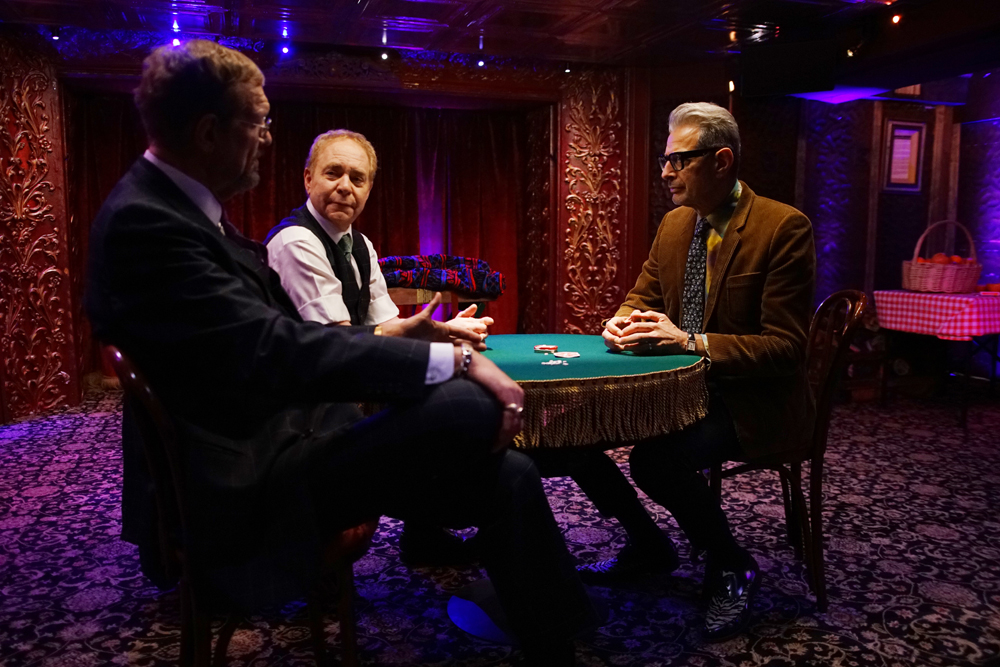Penn & Teller have been gracing stages together for 46 years. Donning impeccable three-piece suits, both carry a stagemanship that is tough to parallel in the age of strobe lights, jumbotrons, and fireworks.
Penn Jillette and his powerful voice have been the exciting side of the duo. He can work a crowd like few today and not just grab but hold its attention. Teller, simply by being silent and through his body language, has a way of mesmerizing an audience with what feels like a delightful mystery.
Their record-breaking Las Vegas show at The Rio has an impressive eight wins as “Las Vegas Magicians of the Year” and was called “The single best show in Vegas,” by the Los Angeles Times.
The duo will appear in season two of The World According to Jeff Goldblum, which launches on Disney+ on November 21, 2021. The pair sits down with Goldblum to discuss magic as a craft and includes a field trip to perform in front of UCLA neuroscientists. We won’t spoil the rest, so watch it for yourself.
The current hit series Penn & Teller: Fool Us! for The CW Network, on which both up-and-comers and magic veterans try to fool Penn & Teller for a chance to star in the pair’s hit Las Vegas stage show, was nominated for a Critic’s Choice Award.
The controversial Showtime series, Penn & Teller: BS!, was nominated for 13 Emmys and was the longest-running series in the history of the network. The show highlighted the pair’s ardent skepticism by tackling the fakes and frauds behind such topics as alien abduction, psychics, and bottled water.
Recently, Innovation & Tech Today had the opportunity to sit down individually with both Penn and Teller (editor’s note: yes, of course, he speaks. Very eloquently, I might add.)

Innovation & Tech Today: In your episode of The World According to Jeff Goldblum, you spoke about blurring the line in magic, lying, and how you guys insist on keeping your show an honest one. And I was wondering, was that intentional?
Penn Jillette: That was completely and utterly intentional. That is the mission statement of Penn and Teller. Magic has until the past 10 years, five years, been in the United States and really throughout the world, predominantly the realm of white men. And usually starting with a boy, usually about 12, trying to get status and ego in being able to fool people. It starts out, many magic careers start out, deeply unpleasant. They started out with Jerry Seinfeld, who has a line like, “Here’s a quarter. Now it’s gone. You’re a jerk. Now it’s back. You’re an asshole. Show’s over.” But that’s all magic. And because when I was young, I was not into magic. Really was not into magic. I was a juggler. And even though juggling and magic are in the same strata at the bottom of show business, they are philosophically exactly the opposite. In magic, you claim to do something you can’t do. In juggling, you claim to do something you can do. Music, of course, falls in between there, because with music you’re not talking about just the skill, you’re talking about also the emotional component. So, magic didn’t interest me. It did not get into my psychological bedrock the way it gets into other magicians.
And then a shitty magician who called himself a scientist, Kreskin, put out an ESP set, which he claimed you could do stuff. And I found out he was a fraud by stumbling onto a book that showed how he did the trick. I flew into a rage. And I not only was not interested in magic, but I explicitly disliked magic, explicitly disliked magicians, thought that the form itself was morally suspect.
Then I met Teller and then I met Amazing Randi. And Teller said two things to me, Randi mostly said that magic could be done morally, and Teller underlined that. And then Teller said that magic was essentially an intellectual art form, which seemed like nonsense when you get a greasy guy in a tux with a lot of birds, torturing women in front of mylar with bad, rip-off Motown music. To see that as intellectual was really weird, but that conversation continued. And there was no way that I was going to be involved in a magic show that was, what I felt, was immoral.
So if you talk to David Blaine, and I really believe I’m not misrepresenting. David Blaine, I think last I talked to him, will tell you that he thinks it’s important to blur the lines of reality to be a magician. I don’t mean that we’re trying to do one thing and others don’t care about it. I mean we’re trying to do one thing, and others are explicitly trying to do something else. Now, David Blaine is a friend of ours. I like him as a person, but I don’t agree with his particular philosophy. I know the United States has fallen away from having friends with who you disagree with profoundly. But, I still do that.

I&T Today: I have really enjoyed Fool Us, and it’s had a good long run. Did you expect it to be as big and hang on as long as it has?
Teller: You never expect that in TV. You expect maybe less than two seasons if you’re really lucky. But Fool Us is our rebellion against typical competition shows because typical competition shows:
A. Are often rude.
B. Are always judged by people who are unqualified.
C. Have no criteria by which the actor is judged.
Right? The “Oh, I really liked him. He was really cute!” Kind of nonsense. Yeah, so basically, they’re a pastime with no substance. And we thought it would be interesting to do a show in which:
A. Everyone was treated very well.
B. The people who are judging know something about the art form.
C. There is an actual criteria by which the act is being judged.
So what we ended up finding was that the best magicians in the world were fascinated by the prospect of this kind of gentlemanly game. We’ll often have famous magicians and famous performers of all kinds, from Steve Martin to everybody else, backstage after our show. But we often find the famous magicians will come to our show, and they’ll hang with us afterward. And they’ll go, “By the way, have you happened to see this? And this, this, this?” Sort of a charming competition, a genteel, playful game going on. And we wanted to pick up that spirit.
Penn: Yes, very honest. And there have been, we’ve had hundreds of people on, hundreds. There’ve been a couple of people who were contentious, but a couple of people contentious out of hundreds, it’s noise. But if you were to see the rough edits, people know in two seconds. I mean I play the suspense, but they know. And that’s the way things should be, right? Competition shows have become so deeply unpleasant trying to get the zinger in, which to me is total bullshit. It’s your show. This poor bastard’s coming on to your show. You have all the muscle. You own the show and then you get them good. What is that? That’s a bully. There’s no other way to see that.
When someone comes into your home to try something, to give you a gift, I mean how were these people brought up? Your reaction must be to say, “Thank you. That’s so kind of you. And oh, by the way, I do know how you did it, but thanks for coming on the show. We love you. Come again, da, da, da, da, da.” Or it’s, “You got us!” And the person does not go “Ha, ha you stupid assholes. I took you down.” They go, “Great!” And then everybody shakes hands. Everybody’s happy.
I&T Today: The show has kind of transformed even less to be about fooling Penn and Teller and more about showcasing young, new, and exciting magic acts that aren’t being seen on national television.
Teller: Absolutely. Absolutely. There is such a difference to a magician between coming on our show where they know that they will be treated respectfully. And also, our producers are very good at finding excellent people. So nobody gets on the show who’s not very good to start with. And then our producers, if it’s someone who’s relatively new to magic on television, will also work with the person, rehearse with the person, improve the act, so that by the time the act gets on TV, it’s really, really good. But yes, it has launched many careers. The most prominent, I suppose, is Piff the Magic Dragon. Piff the Magic Dragon was on America’s Got Talent, but that didn’t get him where he is today, which is, he has his own show on the strip in Las Vegas.

I&T Today: Something that’s always really been inspiring in your act is that you and Teller seem to have such a genuine friendship as part of this as well in over 40, 50 years? That’s a long time.
Penn: 46 years, yes. You know, it’s funny, because Teller and I have a deep friendship because we never tried for it. We always tried to be business partners. We will always arrive on time. We’ll always do our jobs. We will always do our jobs the best we can. That’s all that’s required. Friendship was never required. And if we have an argument or a disagreement or we’re getting on each other’s nerves, there’s a show to do at that time. And there’s work to do here.
We’re like two guys who own a 7-11. Now that being said, after 46 years the first person outside of the family to hold my two children was Teller. When my mother and father died, I talked with Teller. When Teller’s mother and father died, he talked to me. I mean the friendship is very deep, but we still don’t socialize that much. We still have our own circle of friends because there’s nothing to say. We work together 50 hours a week. So if we went out to dinner, we’d say, hey, Teller, what did you do today? Same thing you did stupid! We were there the whole time. Many acts actively hate each other. And that’s a big difference.
I&T Today: How has tech changed magic over the last several decades?
Teller: Problem is, nowadays everybody knows about technology, and everybody knows more about technology than magicians do. But that’s not really a disadvantage. That doesn’t mean one doesn’t use this technology. It means that one uses it the same way one uses a piece of thread. Everybody knows the thread is thin. Everybody knows that against the right background, you can’t see a piece of thread, so you can make something apparently float. But unless you disprove that to the audience, unless you convince the audience that you’re not using a piece of thread, you don’t have a magic trick. However, if you do, if you can find a way to convince the audience that you’re not using this familiar thing, a piece of thread, you might have a sort of miracle. Hence, the way magicians would in that circumstance, maybe pass a hoop back and forth over the object to prove that it’s not being lifted by a thread.
Well, it is being lifted by a thread. The trick lies in the handling of the hoop. And the same thing holds for electronics and in modern media, in magic, that magicians use these methods all the time. But they take great pains to conceal the possibility that they might be using them. To lead you away from the idea that you might be using a magnet or some form of radio communication. And there are ways to sort of rule those things out. I mean, I’ve actually been fooled once on Fool Us by a woman who said, “Now, just to prove that I’m not using any earpieces, I want you to look at my ear.” Right? So she had me looking at her ear, and I said, “Okay, I don’t see anything there.” Well, she was using the tiniest damn earpiece ever.
Penn: [Technology] has closed more doors than it’s opened. It used to be, there were acts that dealt with knowing things. Those acts have all gone away because with Google anyone can do it instantly. Also, you can’t do any effect that could be accomplished with technology even if you don’t use technology. You’ve got to close that door. Magicians used to be at the forefront of technology. They were the first movies. The first movies were all magicians. They were magnetism, all that stuff. But now technology’s become so egalitarian. You ask anybody about major breakthroughs in speech recognition or visual recognition or biometrics, any of that stuff. Everybody knows it. There’s a special on TV. It’s the front page of The New York Times. They know that. So, whereas magicians had a few years with movies all to themselves, in a few years electromagnetism all to themselves, not any longer. I mean, I was tied in with visiting scholars at MIT. I was hanging out at Bell Labs. I have a lot of friends in the sciences. If I get any information quickly, it’s by three minutes, not time to do a bit.
Now, it would be untrue to say that we don’t use any technology for the last 100 years. There are a couple of things, very carefully hidden technology that we then disprove that we’re not using. So there is a servo motor here or there. And there is some queuing here and there that would not have been able to be done 100 years ago. But if you took all technology from the past 100 years out of the Penn and Teller Show, we could still do 90 minutes tonight.
I&T Today: Did you guys ever in your wildest dreams imagine that you would still be doing the same thing and putting on shows?
Penn: Bob Dylan’s son once told me that if his dad had never made it, was completely unknown, he would still be writing those same songs. He had no doubt about that. All I wanted to do from a fairly young age was to be in the arts. I do not say magic but in the arts. And I’m from a small town where the first person I met in show business was me. We had no live performances at all. We had television. And when I first told my parents I wanted to go into show business their reaction was, “You think you’re Johnny Carson?” And they had no idea that there were any other jobs. I never aspired to do a magic show. I never aspired to work in Las Vegas. Those were not on my list of things to do until they happened. I mean not really even 15 minutes before they happened were those my ideas. But I always desperately wanted to perform. And I do believe that if I were not here, I would be somewhere doing some performance.
If you talk to Howard Stern, Paul McCartney, Lady Gaga, Stephen Colbert, they will all tell you that they should be more successful than they are. They should be more famous than they are. Paul McCartney actually says the Beatles weren’t given enough credit. He’s actually said that sentence. These are people with an absolute power drive to be more and more famous. Reading a biography of Houdini years and years and years ago, I realized I didn’t have that drive.
If you told me you’re going to be doing this show, but it will be much less money, much less fame. I’m not saying some sort of hair-shirt suffering, but if you said you’re going to be 1/10 of where you are, I would say groovy. ■











